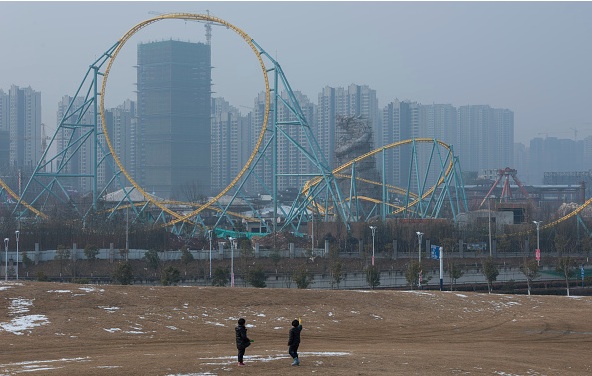
Is China out of money, or are the markets overreacting? Will there be a hard landing, or can China maneuver its way through its current economic difficulties? As China’s markets end a weeklong New Year’s break, there’s a huge debate roiling among global investors and China economists. Concerns about China’s slowing economy have been simmering for months, hitting headlines on January 21 when George Soros commented at the Davos conclave that a hard landing for the Chinese economy is “inevitable.”
Soon after, Arthur Kroeber, founder of Gavekal Dragonomics and a longtime China analyst, published an essay arguing that recent market panic over China’s slowing economy is an overreaction. A hard landing for the economy, he writes, is unlikely. After all, he reminds us, though economic growth is slowing, many estimates suggest China’s economy is still expanding at a decent 6 percent. And while construction and heavy industry are in a slump, the services sector, which now accounts for more than half of China’s economy, is growing fast, and consumer spending remains strong. As this chart shows, a recent BCG study projects continued strong growth for consumer spending. Kroeber also argues that the markets are exaggerating the risk of a financial crisis that might be sparked in part by capital flowing out of the country. Much of the recent outflow of capital—China’s foreign exchange reserves have dropped from $4 trillion to $3.2 trillion since July—reflects simple hedging, and that most of the money, while shifted into dollars, remains in Chinese banks.
Now Kyle Bass, the hedge fund investor who predicted the subprime mortgage crisis back in 2008, is chiming in, and if you listen to him, it’s time to panic. He says China’s economy “has already started to experience a hard landing.” In a letter to investors, Bass argues that rapid credit expansion in the Chinese banking system will result in significant losses, a recapitalization of Chinese banks, and pressure the Chinese currency. “The unwavering faith that the Chinese will somehow be able to successfully avoid anything more severe than a moderate economic slowdown by continuing to rely on the perpetual expansion of credit reminds us of the belief in 2006 that U.S. home prices would never decline,” Bass writes. “Our research suggests that China does not have the financial arsenal to continue on without restructuring many of its banks and undergoing a large devaluation of its currency…What we are witnessing is the resetting of the largest macro imbalance the world has ever seen.”
Whether or not there will be a hard landing, China is facing daunting economic challenges, mapped out in a recent series of blog posts on ChinaFile. A stock market bubble seems to have already burst, with the index dropping sharply since the beginning of the year. (And the government’s botched efforts to calm the markets have further damaged investor confidence.) Overinvestment in real estate is another huge problem: As a percent of GDP, Chinese investment in residential real estate is 60 percent higher than the U.S. peak in 2005. High levels of municipal debt—much of it off-the-books borrowing by local officials who were rewarded for investing in big projects—poses another threat, as the housing market slows and manufacturers run into difficulties. Excess manufacturing capacity—another result of blind investment in recent years—is another drag on the economy. And then there is the question of capital flight.
According to Bass, the central problem is the banking system, and he predicts that in the short run China will have to step in to support its overleveraged banks. In the long run, Kroeber argues, what China needs is more reform, not less. “To make more efficient use of resources, maximize productivity, and satisfy ever-shifting consumer demand,” he writes, “markets must take a leading role, and the government must wean itself off the habit of using state-owned firms to achieve its economic ends.” The worry, he adds, is that despite promises of reform, “Beijing does not seem all that willing to let markets have their way.”
As Curtis Millhaupt and Wentong Zheng point out in a recent Paulson Policy Memorandum, government moves to reform the state-owned enterprise sector have been half-baked. Instead of cutting subsidies and special privileges for SOEs, the government has encouraged “mixed-ownership,” i.e., investment by the private sector, to promote more efficient management and better results. But the authors doubt that the policy will fix the problem: “Focusing on SOE ownership reforms deflects attention from an even more pressing policy issue: how to create an institutional environment more conducive to the growth and innovativeness of all firms in China, regardless of where they fall along the spectrum from state to private ownership.”
Understandably, one of Beijing’s concerns is that market reforms—letting unprofitable state-owned enterprises fall, for example—could lead to job losses and social instability. But as Paulson Institute economic analyst Houze Song recently wrote, the consequences of not restructuring the economy could be even worse. “The net worth of uncompetitive state-owned firms will continue to shrink as they keep losing money while their debt keeps growing. By delaying reform, Beijing will end up holding more debt and less valuable industrial assets,” he wrote. “Prolonging the reform process will make China’s economic—and social—predicament more unmanageable, not less.”


